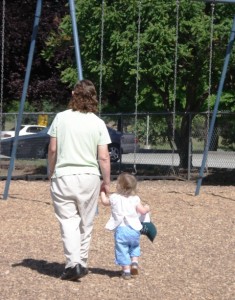Anyone who has read my previous post about my mom (Letting Go of Knowing Why When Loved Ones are Sick) knows that she has Parkinson’s disease (PD to those of us now familiar with it). PD has all the terrible symptoms one thinks of: with tremors throughout her body and “freezing up,” or the inability to walk because that connection from her brain to her feet just won’t work sometimes. But the hardest part of this illness, at least to my brother and me, is the dementia and the decline of her cognitive functioning. Like Alzheimer’s, Parkinson’s causes a person’s mind to slowly slip away. Lately, it’s become worse. The progression of the disease, along with a urinary tract infection that led to sepsis and put her in the hospital, seems to have made her “good days” become far fewer than her “bad days,” when she mumbles incoherently or thinks her walker is the portable commode.
My brother and I usually try to make light of her condition, attempting to find the humor in things, like when she kept referring to the physical therapist as the “power girl” (“when is the power girl coming over?”) or when she asked me very seriously if I had in my “possession two pounds of white See’s candy that looks like pajamas,” (I answered “No, sorry, I don’t” to that one). We don’t laugh at her or her condition, but we cope by finding humor in the absurdity of it all and marveling at the frightening and amazing human brain.
Yet, in other instances, we need to talk her off a metaphorical ledge and try to bring her into our current reality, like when she calls very concerned saying, “Dad died, will you take me to the funeral?” and I have to tell her that her dad died over twenty-five years ago. Then when she questions “well, who died?” and I tell her “no one died, Mom, you’re okay,” she is never fully reassured by this, and neither am I. We don’t know how we can help her, and unfortunately, there is not much we can do at this point, except talk to her and visit her. This brings me to the title of this post, “Progressive Disease Never Gets Easier – and I’m a Wimp,” because it is becoming harder and harder to visit her and try to act like everything is normal and okay while I’m there. In my previous post I wrote, “So, instead, we will continue to visit her regardless of her current state that day. We’ll stick by her, even when the disease takes it all, not knowing the reason why and just letting the idea of fair g o… As we painfully watch we will hope that our presence will make it easier on my mom, the one, in the end, who is suffering the most.” Those words seem hypocritical now because I don’t look forward to seeing her and it’s hard to show-up with a smile. With two busy young kids in sports and other activities it is easy to let time slip by with practices or games and realize that I have not visited my mom in awhile. That fact makes me feel guilty, which makes me avoid the visit, which makes me guiltier, and so it goes.
o… As we painfully watch we will hope that our presence will make it easier on my mom, the one, in the end, who is suffering the most.” Those words seem hypocritical now because I don’t look forward to seeing her and it’s hard to show-up with a smile. With two busy young kids in sports and other activities it is easy to let time slip by with practices or games and realize that I have not visited my mom in awhile. That fact makes me feel guilty, which makes me avoid the visit, which makes me guiltier, and so it goes.
We’ve all seen or read about families who leave their parents or loved ones to rot away in a nursing home or retirement place, never visiting, or doing so once a year for twenty minutes. I always thought they were uncaring jerks and questioned how people could do that to “their own parents!” but maybe now I see why a little more clearly. Maybe it’s just too hard and they can’t face seeing their loved one turn from a “normal” person to a nearly unrecognizable shell of who they once were. It’s agonizing to watch and too painful to accept, so they don’t. They hide, pop up once a year, and retreat back to their own world where this reality doesn’t exist. I get it and oftentimes would like to do the same, but I don’t. And yet, I could do more. My brother calls my mom once a day and drives up to visit her once a month regardless of what is going on in his life. His strength and fortitude far exceed mine.
But pain is no excuse, at least not a good one. Just because it’s difficult does not mean it’s acceptable to avoid it. The truth in this situation is that I can’t come to a full acceptance of her progressive disease because the disease keeps changing, so once I accept it, the disease has progressed and my mom can’t remember what day it is; a short time later, I must now accept that she thinks See’s candy looks like pajamas. It does not stop until the disease stops, and then she is no longer here. There is no good answer or solution; and it seems near impossible to look for a bright side or some positive way to view it all. Sometimes, I’m realizing, it’s best to keep your head down and keep moving forward, to show-up while staying the course, be it a progressive disease or a marathon with an unknown end.




